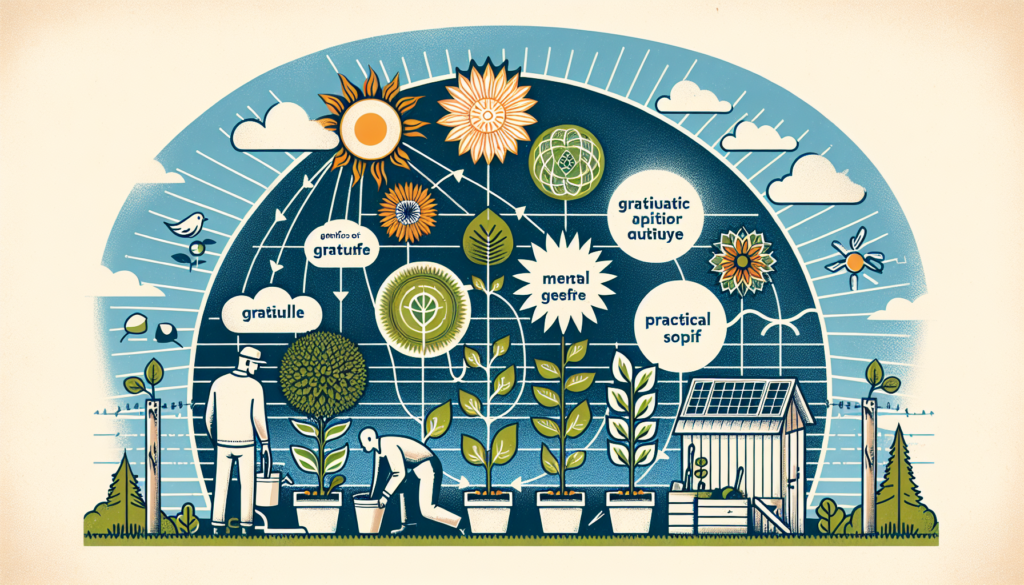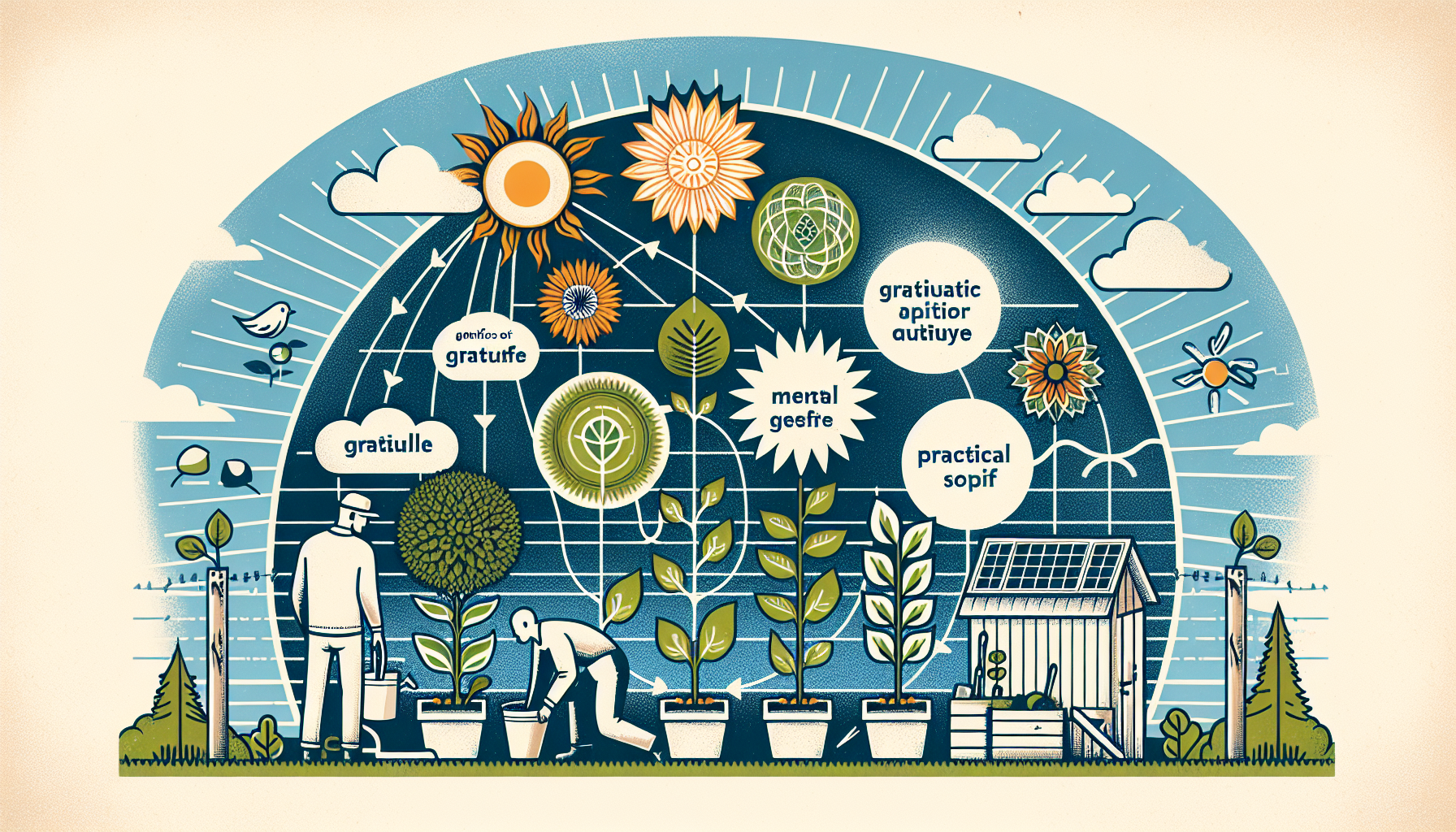Cultivating An Attitude Of Gratitude In Daily Life
Imagine waking up every morning with a sense of joy and contentment, ready to take on the day ahead. Picture yourself going through your daily activities with a smile on your face and a heart full of gratitude. Cultivating an attitude of gratitude in daily life can have a profound impact on our overall well-being and happiness. By focusing on the positive aspects of our lives, we can shift our perspective and embrace a more grateful mindset. In this article, we will explore the importance of cultivating gratitude in our daily lives and discover simple practices to help us adopt this attitude. Get ready to embark on a journey of gratitude that will transform your daily experiences and leave you feeling more fulfilled.

Benefits of cultivating an attitude of gratitude
Improved mental health
Cultivating an attitude of gratitude can have a profound impact on your mental health. When you focus on the positive aspects of your life and express gratitude for them, you enhance your overall well-being. Gratitude helps shift your perspective from dwelling on negative thoughts to acknowledging and appreciating the good things that surround you. Research has shown that individuals who regularly practice gratitude experience lower levels of depression, anxiety, and stress.
Increased happiness and life satisfaction
Gratitude has the power to make you happier and more satisfied with your life. When you take the time to reflect and express gratitude for the blessings in your life, you create a sense of contentment and fulfillment. Studies have found that people who regularly practice gratitude have higher levels of positive emotions and overall life satisfaction. By adopting an attitude of gratitude, you can experience greater joy and fulfillment in your daily life.
Stronger relationships
Gratitude plays a significant role in nurturing and strengthening relationships. When you express appreciation and gratitude towards others, you reinforce positive connections and deepen emotional bonds. Showing appreciation to your loved ones, friends, and colleagues can make them feel valued and appreciated, leading to more meaningful and fulfilling relationships. Additionally, when you express gratitude, it encourages reciprocation, fostering a cycle of kindness and gratitude among those around you.
Enhanced empathy and reduced aggression
Practicing gratitude can lead to enhanced empathy and reduced aggression. When you cultivate an attitude of gratitude, you become more aware of the kindness and support you receive from others. This heightened awareness can increase your empathy towards others, allowing you to better understand and relate to their experiences. Additionally, gratitude helps reduce aggressive behavior by promoting feelings of empathy and forgiveness. It can help you let go of anger and resentment, leading to healthier and more harmonious interactions with others.
Better physical health
Cultivating gratitude not only improves your mental well-being but also has positive effects on your physical health. Research has shown that gratitude practices can reduce symptoms of physical illnesses, improve quality of sleep, and enhance overall cardiovascular health. The positive emotions associated with gratitude have been found to boost the immune system, decrease inflammation, and promote better self-care behaviors. Embracing an attitude of gratitude can have a holistic impact on your well-being.
Practices to cultivate gratitude
Keeping a gratitude journal
Keeping a gratitude journal is a simple and effective way to cultivate gratitude in your daily life. Each day, take a few minutes to write down three things you are grateful for. Reflecting on these positive aspects of your life can help shift your mindset towards gratitude and foster a sense of appreciation.
Expressing gratitude to others
Expressing gratitude to others is a powerful practice that not only benefits you but also strengthens your relationships. Take the time to thank people for their kindness, support, or even for the small things they do for you. Whether it’s through a heartfelt conversation, a handwritten note, or a thoughtful gesture, expressing gratitude can make a positive impact on both your life and the lives of others.
Meditating on gratitude
Meditation is a practice that allows you to quiet your mind and focus on the present moment. Incorporating gratitude into your meditation practice can deepen your sense of appreciation and well-being. During your meditation session, take a few moments to reflect on the things you are grateful for, allowing yourself to fully embrace the feelings of gratitude.
Practicing mindfulness
Mindfulness involves being fully present and aware of the present moment without judgment. By practicing mindfulness, you can enhance your ability to notice and appreciate the simple joys and blessings in your daily life. Engage in activities mindfully, savoring each moment and acknowledging the beauty and positivity that surrounds you.
Counting blessings
Taking the time to count your blessings is a practice that reminds you of the abundance in your life. Each day, make a conscious effort to mentally or verbally list the things you are grateful for. It could be as simple as having a loving family, good health, or a roof over your head. Counting your blessings helps cultivate gratitude by focusing your attention on the positive aspects of your life.
Incorporating gratitude into daily routines
Gratitude rituals in the morning
Start your day on a positive note by incorporating gratitude rituals into your morning routine. Before getting out of bed, take a moment to reflect on three things you are grateful for. This could be the opportunity to embrace a new day, the love and support of your family, or the simple pleasures in life. By setting an intention of gratitude, you create a foundation of positivity for the day ahead.
Expressing gratitude during meals
Mealtimes provide a wonderful opportunity to express gratitude. Before eating, pause for a moment and express your thanks for the food on your plate. Acknowledge the effort that went into growing, preparing, and serving the meal. By incorporating gratitude into your meals, you can cultivate a sense of mindfulness and appreciation for the nourishment that sustains you.
Gratitude exercises before bedtime
As you wind down at the end of the day, spend a few minutes practicing gratitude before bedtime. Reflect on the events of the day and identify three things that you are grateful for. This practice not only helps you end the day on a positive note but also encourages a restful and grateful mindset as you drift off to sleep.
Adding gratitude to daily affirmations
Affirmations are positive statements that can help shift your mindset and improve your self-belief. By incorporating gratitude into your daily affirmations, you can amplify their impact. Add statements such as “I am grateful for the blessings in my life” or “I appreciate the love and support that surrounds me” to remind yourself of the abundance and positivity in your life.
Challenges to cultivating gratitude
Overcoming negativity bias
The human brain is wired to focus more on negative experiences rather than positive ones. Overcoming this natural negativity bias can be a challenge when cultivating gratitude. It requires conscious effort to shift your attention towards the positive aspects of your life and rewire your brain to focus on gratitude. However, with consistent practice, you can train your mindset to overcome this bias and embrace a more grateful outlook.
Dealing with difficult situations
During challenging times, finding gratitude may feel particularly difficult. It is natural to feel overwhelmed, frustrated, or upset in such situations. However, even during trying times, it is possible to find something to be grateful for. Shifting your focus towards the lessons, growth, or even the support you receive can help reframe difficult situations and open up avenues for gratitude.
Avoiding comparison traps
Comparing your life to others can prevent you from fully cultivating gratitude. It is essential to appreciate what you have rather than constantly striving for what others have. Each person’s journey is unique, and acknowledging your own blessings and accomplishments can help foster gratitude and allow you to embrace your own path with contentment.
Unrealistic expectations
Setting unrealistic expectations can hinder your ability to cultivate gratitude. When you expect perfection or constantly seek more, it becomes challenging to appreciate and be grateful for what you already have. Instead, set realistic expectations and focus on the abundance and blessings that exist in your life.

Gratitude as a mindset
Shifting perspective
Gratitude can be seen as a mindset that involves shifting your perspective towards the positive aspects of your life. By choosing to focus on gratitude, you train your mind to seek the good in every situation, no matter how challenging it may seem. This shift in perspective helps you cultivate a resilient and grateful mindset.
Focusing on the present moment
Practicing gratitude encourages you to focus on the present moment, rather than dwelling on the past or worrying about the future. By being fully present and engaged, you can appreciate the little things that often go unnoticed. The ability to find gratitude in the present moment allows you to savor life’s experiences and find joy in the simplest of things.
Reframing challenges as opportunities
Gratitude helps you reframe challenges as opportunities for growth and learning. Instead of viewing setbacks or obstacles as negative experiences, approaching them with gratitude allows you to see the lessons and possibilities they offer. By reframing challenges in this way, you can embrace a more positive and empowered mindset.
Appreciating the little things
Gratitude encourages you to appreciate the little things that make life meaningful and special. Whether it’s a beautiful sunset, a kind gesture from a stranger, or a moment of laughter with loved ones, acknowledging and appreciating these small joys can bring immense happiness and gratitude into your life. Cultivating gratitude for the little things helps you find beauty and positivity on a daily basis.
Scientific research on gratitude
Positive psychology studies
Positive psychology research has extensively studied the effects of gratitude on well-being. Numerous studies have shown that gratitude interventions, such as gratitude journaling or practicing gratitude exercises, can lead to significant improvements in overall happiness, life satisfaction, and positive emotions.
Effects on brain activity
Neuroscientists have discovered that practicing gratitude can have measurable effects on brain activity. Gratitude activates areas of the brain associated with the release of dopamine, a neurotransmitter that plays a key role in experiencing pleasure and motivation. This suggests that gratitude has a direct impact on our brain chemistry, leading to increased feelings of contentment and well-being.
Relationship between gratitude and well-being
Research has consistently highlighted a strong relationship between gratitude and overall well-being. Studies have found that individuals who regularly practice gratitude experience higher levels of positive emotions, lower levels of depression and anxiety, and greater life satisfaction. Additionally, gratitude has been linked to better sleep quality, increased resilience, and improved self-esteem.
Importance of gratitude in psychological interventions
Gratitude is increasingly recognized as a valuable component in psychological interventions. Therapists and counselors often incorporate gratitude exercises and interventions into their treatment plans. Gratitude-based interventions have been found to enhance therapy outcomes, promote positive emotions, and improve overall mental well-being.
Teaching gratitude to children
Modeling gratitude behavior
One of the most effective ways to teach gratitude to children is by modeling the behavior ourselves. Children learn by observing and imitating their parents and caregivers. Expressing gratitude regularly and authentically in front of children provides them with a role model and sets the foundation for cultivating their own attitude of gratitude.
Encouraging gratitude reflection
Encourage children to reflect on the things they are grateful for by incorporating gratitude rituals into their daily lives. Start a family tradition of sharing one thing each person is grateful for at mealtimes or before bedtime. This practice helps children develop the habit of recognizing and appreciating the positive aspects of their lives.
Writing thank-you notes
Teaching children to write thank-you notes is a powerful way to cultivate gratitude and foster appreciation. Encourage them to express their thanks to friends, family members, teachers, or anyone who has done something kind or helpful. Writing thank-you notes not only nurtures gratitude but also teaches children the importance of acknowledging and valuing others.
Volunteering and giving back as a family
Engaging in volunteer activities as a family provides children with firsthand experiences of gratitude and the opportunity to give back to the community. Whether it’s volunteering at a local shelter, participating in a fundraising event, or helping those in need, these experiences cultivate empathy, gratitude, and a sense of social responsibility in children.
Gratitude and self-care
Recognizing self-worth
Gratitude plays a crucial role in recognizing and appreciating your own self-worth. By focusing on the blessings and strengths within yourself, you can develop a sense of gratitude for who you are as an individual. When you acknowledge your worth and embrace self-love, you can cultivate a deeper sense of gratitude for your unique qualities and contributions.
Practicing self-compassion
Self-compassion involves treating yourself with kindness, understanding, and forgiveness. Cultivating gratitude can enhance self-compassion by helping you appreciate and acknowledge the positive aspects of yourself. By practicing self-compassion and gratitude, you can foster a kind and nurturing relationship with yourself, promoting overall well-being and happiness.
Prioritizing self-care activities
Incorporating gratitude into your self-care activities can amplify their benefits. Whether it’s taking a bubble bath, practicing yoga, or going for a walk in nature, expressing gratitude for the opportunity to care for yourself allows you to fully embrace the experience. By prioritizing self-care and expressing gratitude for these moments, you nurture your well-being on a deep level.
Gratefulness for personal growth
Gratitude can help you appreciate the journey of personal growth and the lessons learned along the way. Instead of focusing solely on end goals, practicing gratitude for the progress and growth you have achieved allows you to celebrate your accomplishments. Embracing gratitude for your personal development fosters a positive mindset and fuels your motivation for continued growth.
Gratitude in the workplace
Expressing gratitude to colleagues
Incorporating gratitude into the workplace can significantly improve employee morale and satisfaction. Expressing gratitude to colleagues for their hard work, support, or contributions not only enhances positive relationships but also promotes a collaborative and appreciative work environment. Regularly acknowledging and thanking your co-workers can create a culture of gratitude within the workplace.
Recognizing and appreciating accomplishments
Gratitude in the workplace involves recognizing and appreciating the accomplishments of individuals and teams. By celebrating milestones, successes, and achievements, you foster a sense of pride and motivation among employees. Acknowledging the efforts and contributions of others through public recognition or appreciation awards cultivates a culture that values excellence and gratitude.
Creating a positive work culture
Gratitude can be a driving force in creating a positive work culture. When leaders and employees express gratitude towards each other, it fosters trust, respect, and a sense of belonging. Encouraging a culture where gratitude is openly expressed and appreciated creates a supportive and uplifting work environment where individuals thrive.
Gratitude for work-life balance
Incorporating gratitude into the workplace also includes recognizing and valuing work-life balance. Expressing gratitude for flexible work hours, supportive policies, or the ability to pursue personal interests alongside work responsibilities promotes a healthy work-life integration. Cultivating a sense of gratitude for work-life balance helps employees maintain overall well-being and engagement.
Conclusion
Cultivating an attitude of gratitude has countless benefits for your mental, emotional, and physical well-being. By incorporating gratitude practices into your daily life, you can experience improved mental health, increased happiness, and stronger relationships. Facing challenges with gratitude and reframing them as opportunities can transform your perspective and enhance your resilience. Scientific research has consistently demonstrated the positive effects of gratitude on overall well-being. Teaching gratitude to children, practicing gratitude in self-care, and promoting gratitude in the workplace are all essential aspects of embracing gratitude as a mindset. By consciously cultivating an attitude of gratitude, you can lead a more fulfilling, joyful, and grateful life.







